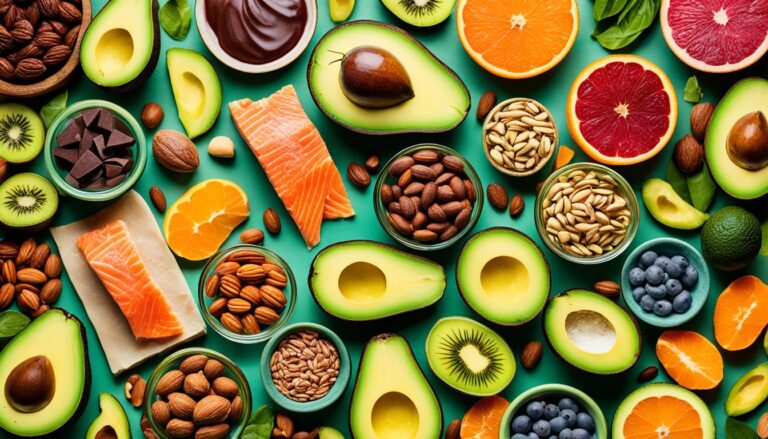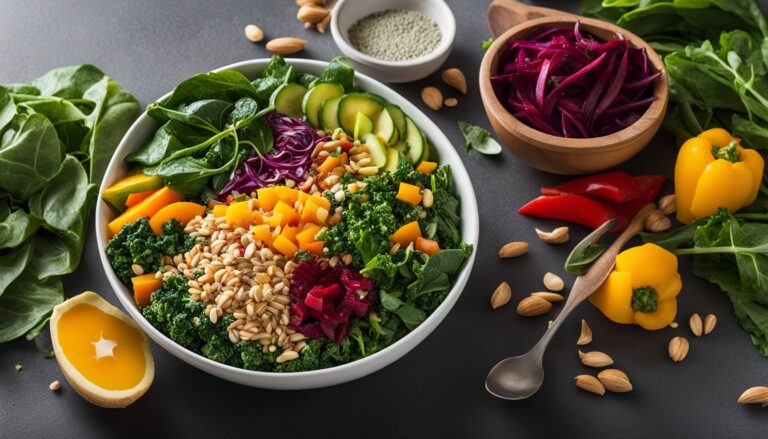Can you achieve significant weight loss without feeling deprived or following a restrictive diet? This question resonates with many who have struggled with traditional weight loss methods.
Maintaining a calorie deficit is crucial for weight loss, but it doesn’t necessarily require dieting. By focusing on health promoting habits and making sustainable lifestyle adjustments, individuals can naturally achieve their weight goals.
This comprehensive guide explores evidence-based approaches to weight management that prioritize overall health and well-being over restrictive dieting regimens.
Key Takeaways
- Achieving weight loss without dieting is possible through sustainable lifestyle changes.
- Creating a calorie deficit is key to weight loss, but it can be done without exercise.
- Healthy habits and mindful eating can lead to natural weight loss.
- Traditional diets often fail due to their restrictive nature.
- Alternative approaches focus on addition, not subtraction, for successful weight management.
Understanding Weight Loss Beyond Traditional Dieting
Sustainable weight loss requires a deeper understanding beyond traditional dieting. To achieve lasting results, it’s essential to comprehend the underlying factors that influence weight management.
The Problem with Conventional Diets
Conventional diets often rely on restrictive eating patterns, which can be difficult to maintain in the long term. Research has shown that 80-95% of dieters regain lost weight within 1-5 years.
This high failure rate is attributed to various factors, including metabolic slowdown and hormonal changes triggered by restrictive dieting. Restrictive dieting can lead to a vicious cycle of weight loss and regain, making it challenging to achieve sustainable weight loss.

The Science of Sustainable Weight Loss
The science behind sustainable weight loss reveals that gradual, consistent changes produce better long-term results than rapid weight loss approaches. Studies have demonstrated that weight loss maintenance depends more on behavioral adaptations and habit formation than on specific diet plans.
The body’s complex regulatory systems, including hormones like leptin and ghrelin, play crucial roles in weight regulation beyond simple calorie counting. As noted by research Understanding the difference between weight loss and fat loss helps explain why some approaches lead to temporary results while others create lasting change.
By focusing on sustainable lifestyle changes rather than quick fixes, individuals can achieve more effective weight loss outcomes. This approach involves understanding the psychological factors that impact weight management, such as stress and emotional eating patterns, and developing strategies to address these factors.
Is There a Way to Lose Weight Without Dieting?
Many individuals struggle with the idea of dieting, wondering if there’s an alternative approach to achieve their weight loss goals. The best way to promote healthy, sustainable weight loss is through long-lasting lifestyle changes including a healthy eating plan and physical activity.
The Difference Between Dieting and Healthy Eating Habits
Dieting often involves restrictive eating patterns that can be difficult to maintain in the long term. In contrast, adopting healthy eating habits focuses on making sustainable lifestyle changes that promote overall well-being. Healthy eating habits are about creating a balanced relationship with food, rather than following a temporary diet plan.
Research demonstrates that sustainable weight management comes from building consistent habits rather than following temporary eating plans. By focusing on nutrient-dense foods and mindful eating practices, individuals can develop a healthier approach to weight management.
Creating a Calorie Deficit Without Restrictive Diets
Maintaining a calorie deficit is crucial for losing weight, but it doesn’t require strict food rules or elimination diets. By making mindful adjustments to portion sizes and food choices, individuals can achieve a calorie deficit without feeling deprived.
The concept of crowding out less nutritious foods by adding more nutrient-dense options represents a positive approach to dietary change without restriction.

Understanding energy balance as a long-term concept rather than a daily requirement helps create more flexible approaches to weight management. By focusing on overall patterns rather than daily calorie counts, individuals can develop a more sustainable and balanced approach to weight loss.
As emphasized by health experts,
The key to successful weight loss is not dieting, but rather adopting a healthier lifestyle that includes a balanced diet and regular physical activity.
This approach not only supports weight loss but also promotes overall health and well-being.
Smart Food Choices That Support Weight Loss
Certain food choices can naturally support weight loss by enhancing satiety and metabolism. Making informed decisions about what we eat is crucial for effective weight management.
Prioritizing Protein-Rich Foods
Protein rich foods are essential for weight loss as they increase thermogenesis and preserve lean muscle mass. Consuming 25-30g of protein per meal can optimize satiety and help maintain muscle mass during weight loss. Examples of protein-rich foods include lean meats, fish, eggs, and dairy products.
Incorporating Fiber Rich Foods
Fiber rich foods create physical fullness with fewer calories and slow down digestion stabilizing blood sugar levels. Studies have shown that individuals consuming 25-30g of fiber daily tend to lose more weight than those consuming less fiber. Whole grains, vegetables, and fruits are excellent sources of dietary fiber.
| Food Type | Examples | Benefits for Weight Loss |
|---|---|---|
| Protein Rich Foods | Lean meats, fish, eggs, dairy | Increases thermogenesis, preserves muscle mass |
| Fiber-Rich Foods | Whole grains, vegetables, fruits | Creates fullness, slows digestion, stabilizes blood sugar |
| Nutrient-Dense Foods | Vegetables, whole grains, lean proteins | Provides essential vitamins and minerals, supports metabolic functions |
Choosing Nutrient Dense Options
Nutrient-dense foods provide essential vitamins and minerals that support metabolic functions while delivering greater satiety per calorie than processed alternatives. The concept of volumetrics which involves choosing foods with high water and fiber content, allows for larger, more satisfying portions while naturally reducing caloric intake.

By focusing on protein-rich, fiber-rich, and nutrient-dense foods, individuals can make smart food choices that support their weight loss goals without requiring calorie counting.
Portion Control Strategies Without Counting Calories
Portion control strategies can help reduce calorie intake without counting calories. Managing the amount of food consumed during meals is crucial for achieving weight loss and maintaining overall health. By implementing effective portion control techniques individuals can develop sustainable eating habits that support their weight loss goals.
Using Smaller Plates and Bowls
One effective method for controlling portions is using smaller plates and bowls. Research confirms that this can reduce food consumption by 15-20% by exploiting the Delboeuf illusion, where portions appear larger on smaller dishes.
A 2021 review found that portion-control plates helped reduce body weight, BMI, waist circumferences, and blood lipid markers. By making servings look larger, individuals can feel satisfied with less food, ultimately consuming fewer calories.

Visual Portion Guidelines
Another strategy is using visual portion guidelines, such as hand measurements. For example, using the palm to measure protein portions or a fist to measure vegetable portions provides a portable and personalized approach to portion control.
Implementing the half plate rule where half the plate is filled with non starchy vegetables automatically creates an appropriate portion balance. This method simplifies meal planning and helps individuals lose weight without feeling deprived.
By combining these strategies, individuals can develop a healthier relationship with food and achieve their weight loss goals without the need for restrictive diets or counting calories. Effective portion control can lead to a reduction in overall weight and pounds lost over time.
Hydration and Beverage Choices for Weight Management
The relationship between hydration and weight management is complex and multifaceted. Adequate hydration is essential for various bodily functions that influence weight loss and overall health.
The Impact of Water on Weight Loss
Drinking water may help contribute to weight loss, especially when consumed before meals. Research has shown that drinking water before a meal can reduce the amount of food consumed without significantly affecting satiety.
A 2018 study found that participants who drank water before a meal reduced their food intake. Additionally, proper hydration increases resting energy expenditure, potentially burning more calories daily.
Some key benefits of water for weight loss include appetite regulation, increased fullness, and enhanced metabolic function. Drinking 16-20 ounces of water before meals can reduce caloric intake by 75-90 calories per meal.
Eliminating Sugary Drinks and Alcohol
Beverages like sugary drinks and alcohol can significantly contribute to weight gain due to their high calories content and lack of satiety signals. Replacing these beverages with water or other low calorie options can lead to significant weight loss over time.
For instance, replacing just one 12-ounce sugary beverage daily with water can result in 10-15 pounds of weight loss over a year without other dietary changes.
Strategic beverage choices, such as unsweetened tea, black coffee, and infused water, can support weight management while providing flavor variety. By making informed choices about what we drink, individuals can better manage their weight and improve overall health.
Lifestyle Factors That Influence Weight Beyond Food
Beyond dietary changes, several lifestyle factors play a crucial role in weight management. These elements can significantly impact your body’s ability to lose weight and maintain weight loss over time.
The Critical Role of Quality Sleep
Getting enough sleep is crucial for weight management. Research demonstrates that sleep deprivation disrupts appetite regulating hormones increasing hunger and cravings for high calorie foods. Adults should get at least 7 hours of sleep each night.
Stress Management Techniques
Stress can impact weight by elevating cortisol levels, promoting abdominal fat storage, and triggering emotional eating. Techniques like meditation and deep breathing can help reduce stress-related eating.
Non-Exercise Movement Throughout the Day
Incorporating physical activity throughout the day can impact weight management. Non-exercise activity thermogenesis NEAT can make a significant difference in daily energy expenditure. Simple strategies include taking hourly movement breaks and using a standing desk.
Meal Planning and Preparation for Effortless Weight Control
Preparing meals at home is associated with better weight management outcomes. This approach allows individuals to control the nutritional content of their meals, leading to healthier eating habits.
Nutritional Benefits of Home Cooked Meals
Cooking meals at home is a great way to include more nutritious foods in your diet, which might also help promote weight loss. Research has shown that people who prepare more meals at home tend to gain less weight than those who regularly dine out or eat prepared foods.
- Home-cooked meals typically contain 60-70% fewer calories than comparable restaurant meals while providing greater nutritional value and satiety.
- Individuals who prepare meals at home consume approximately 200 fewer calories per day and ingest significantly less sodium, sugar, and unhealthy fats.
Effective Meal Preparation Strategies
Simple meal prep strategies can make a significant difference in maintaining a healthy diet. By dedicating just 1-2 hours weekly to meal planning and preparation, individuals can save money, reduce food waste, and support consistent weight management.
| Meal Prep Strategy | Benefits |
|---|---|
| Preparing protein sources in advance | Facilitates quick assembly of nutritious meals |
| Batch cooking vegetable bases | Reduces meal preparation time during busy weekdays |
| Having healthy options readily available | Reduces the likelihood of choosing convenience foods or takeout |
By implementing these strategies, individuals can maintain steady blood sugar levels throughout the day, preventing energy crashes that often lead to unhealthy food choices.
Conclusion Creating Sustainable Habits for Long Term Success
Effective weight loss strategies focus on long-term lifestyle changes rather than temporary dietary restrictions. By integrating mindful eating, smart food choices, and regular physical activity, individuals can achieve sustainable weight management.
The Centers for Disease Control and Prevention CDC recommend at least 150 minutes of moderate-intensity aerobic exercise and two days of resistance training per week alongside a balanced diet rich in whole foods, including fruits, vegetables, whole grains, lean proteins, and low-fat dairy products.
Research demonstrates that gradual weight loss through lifestyle modifications leads to more sustainable results. By focusing on health promoting behaviors and developing sustainable habits individuals can reduce their risk for chronic conditions like type 2 diabetes and heart disease. This holistic approach not only supports weight loss but also enhances overall health and wellbeing.





